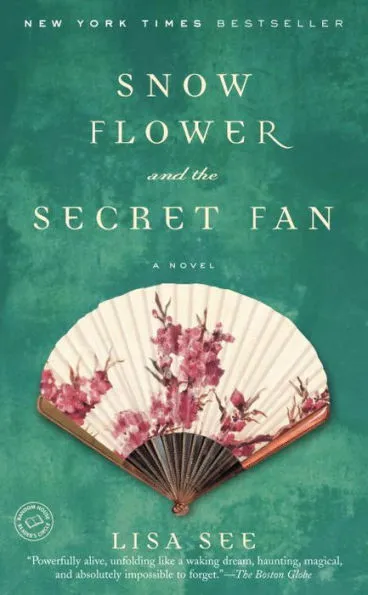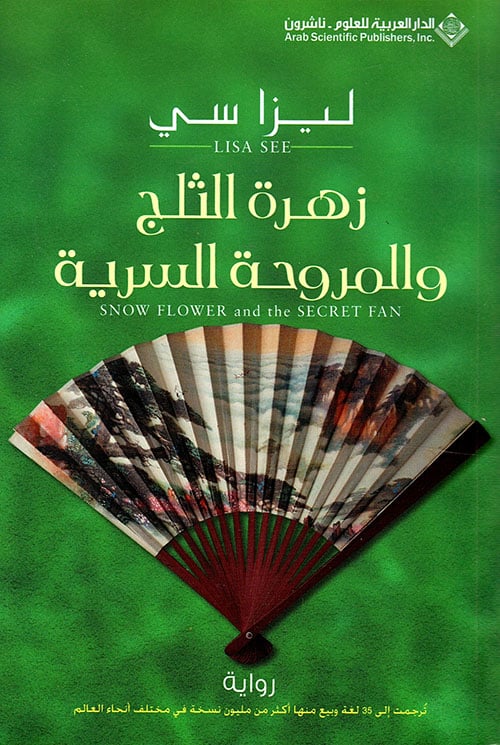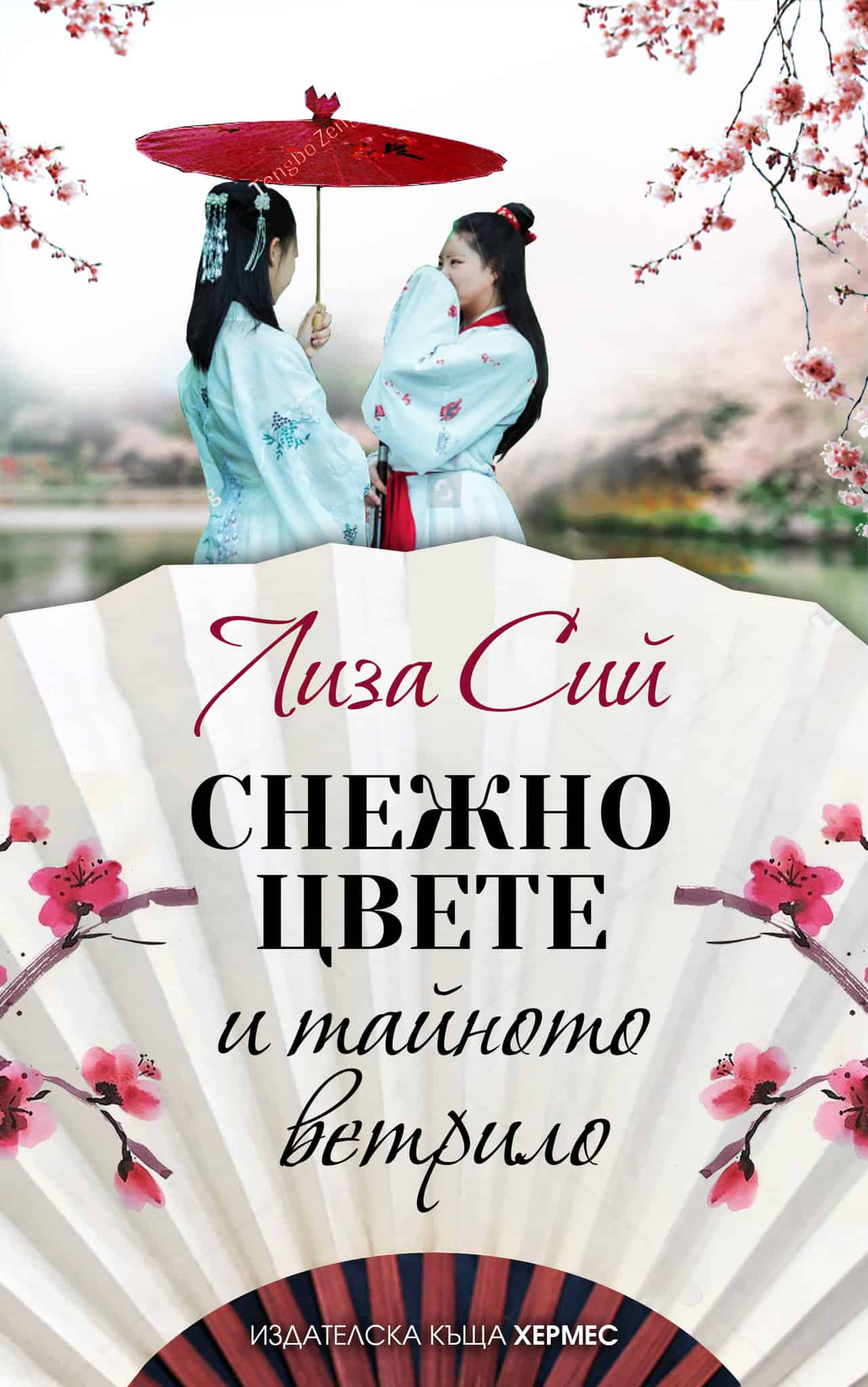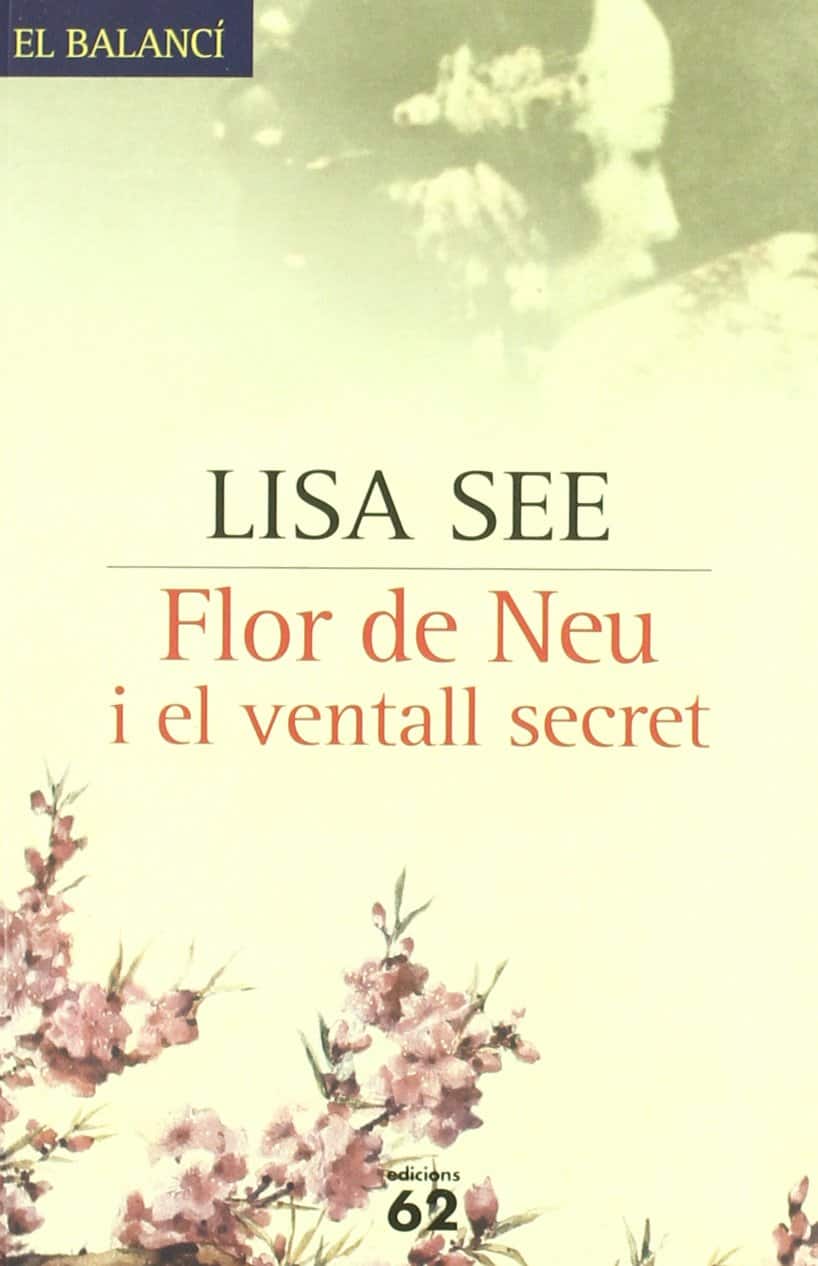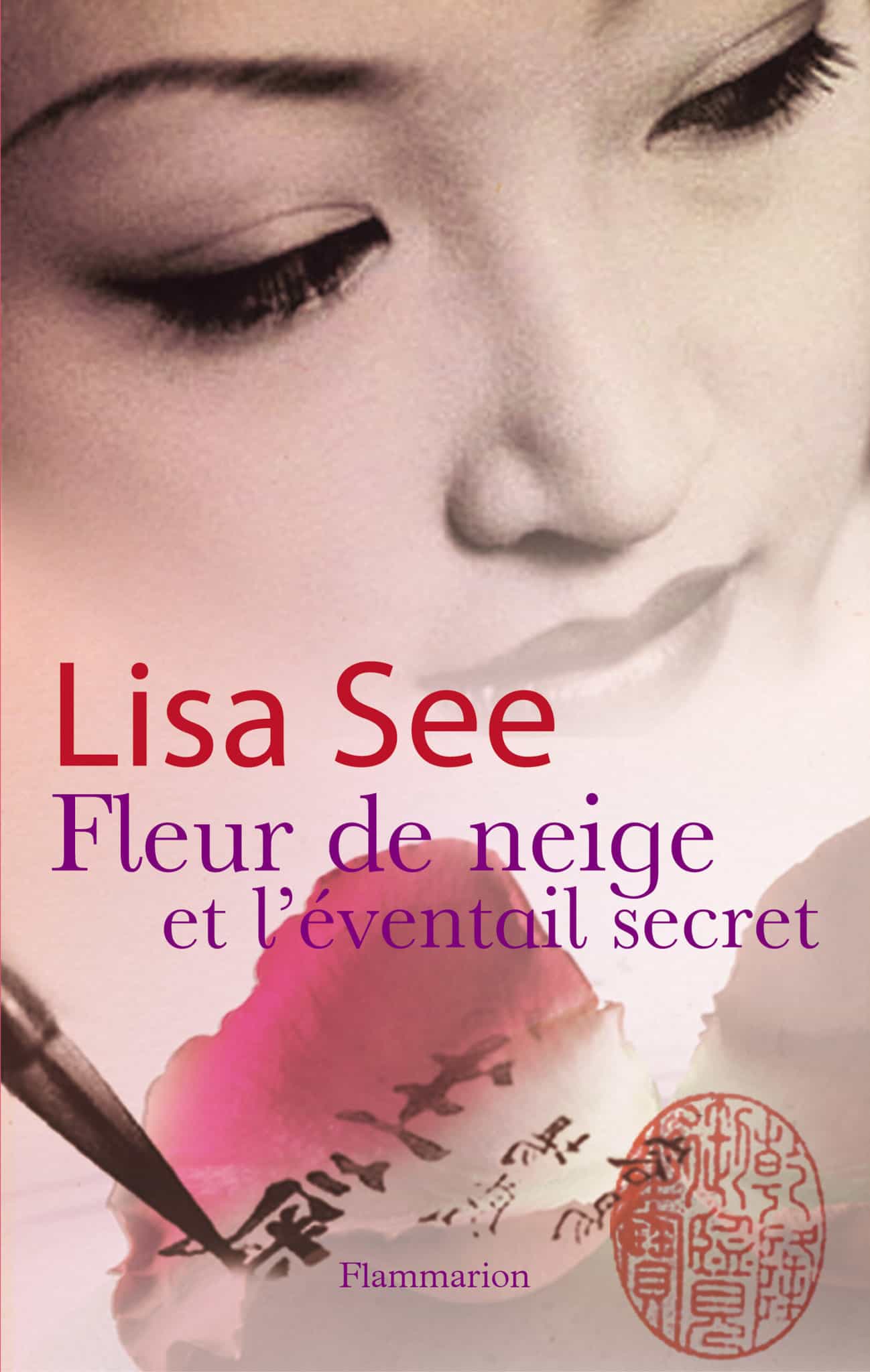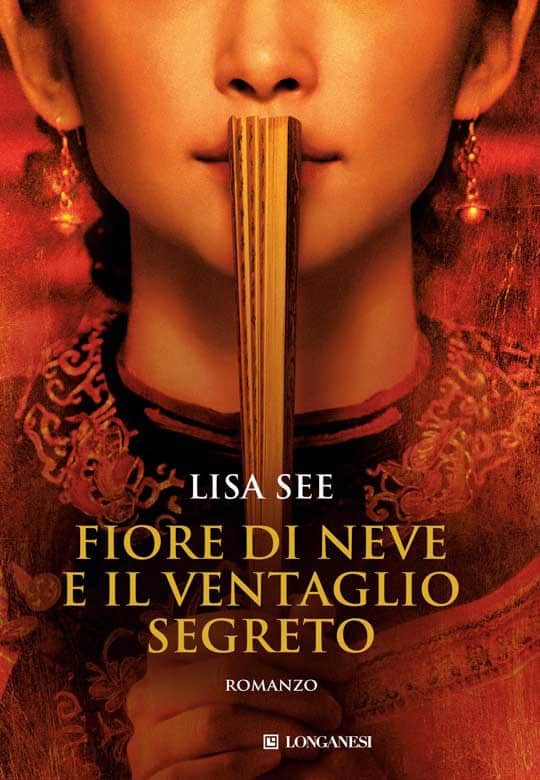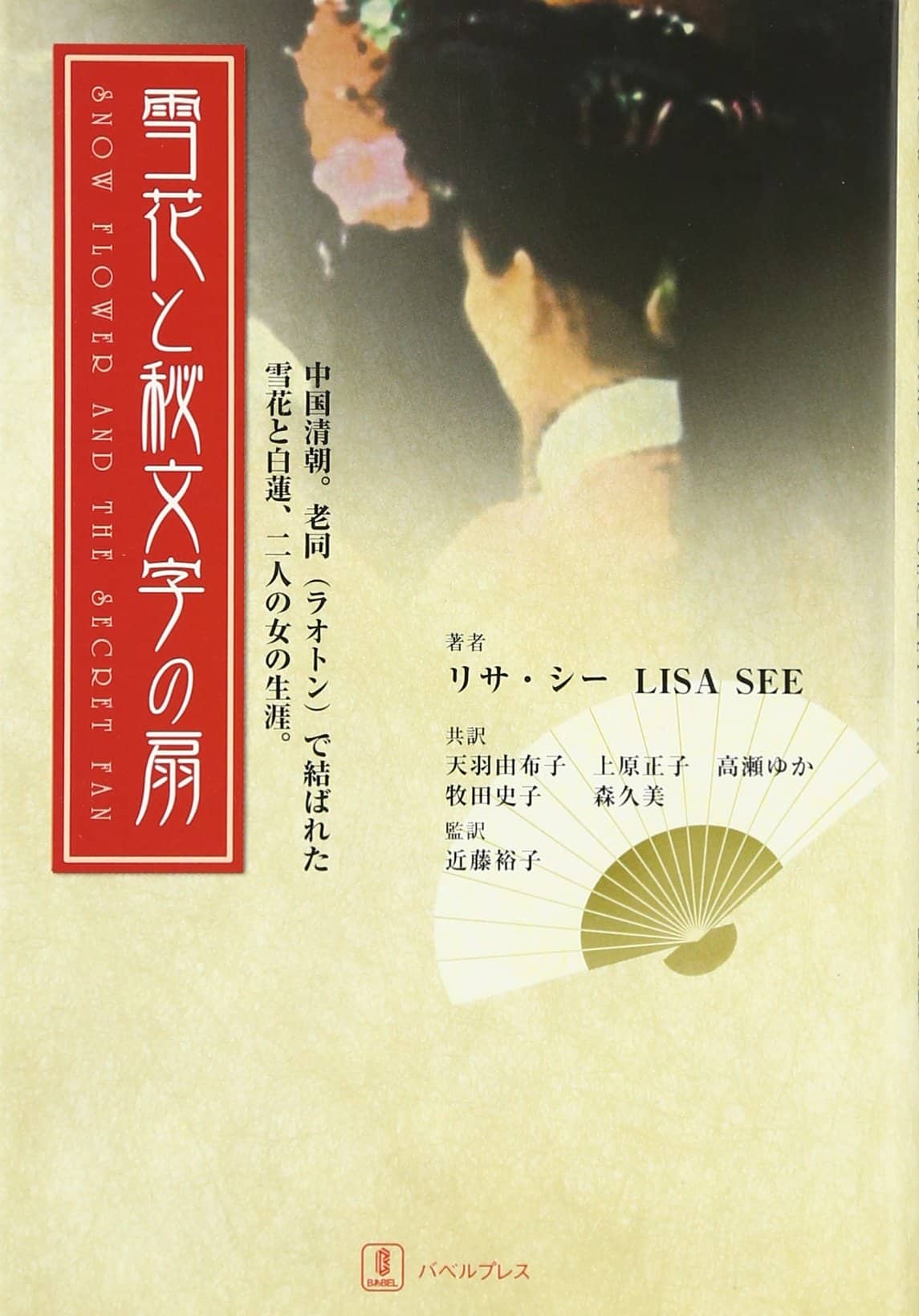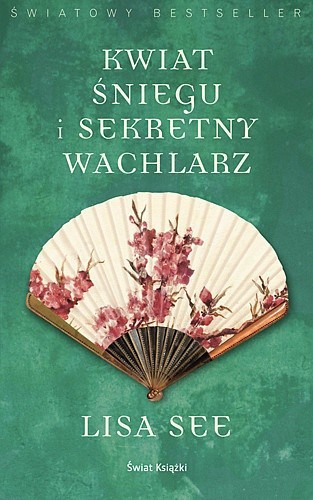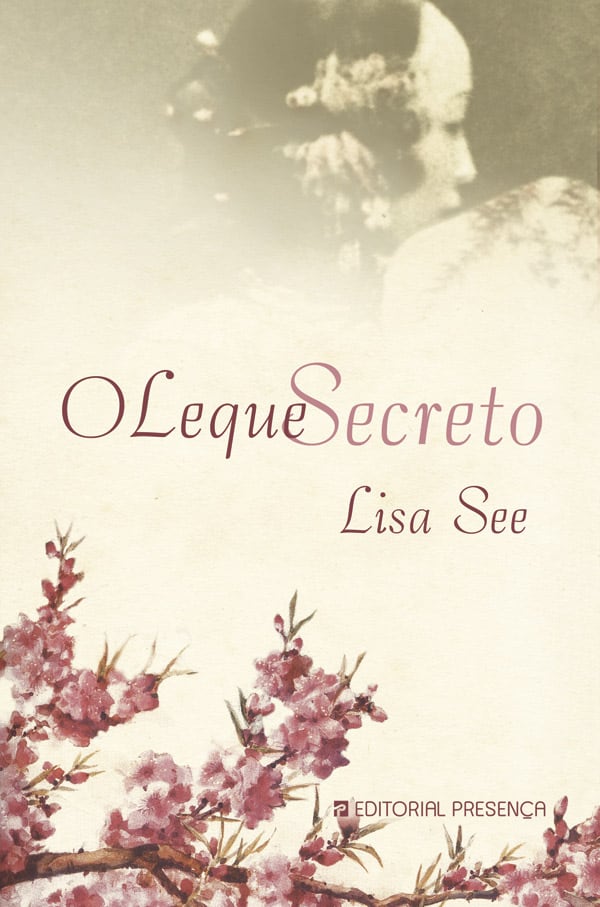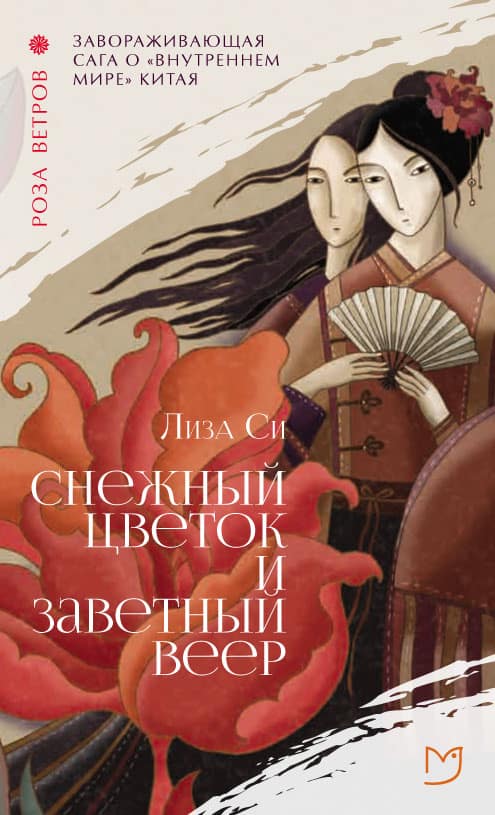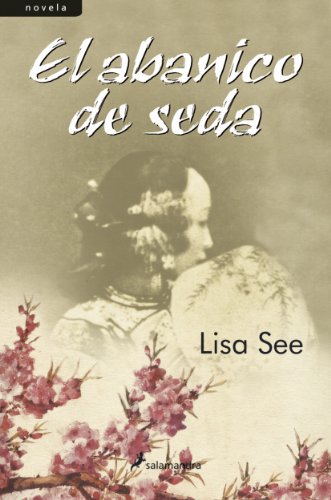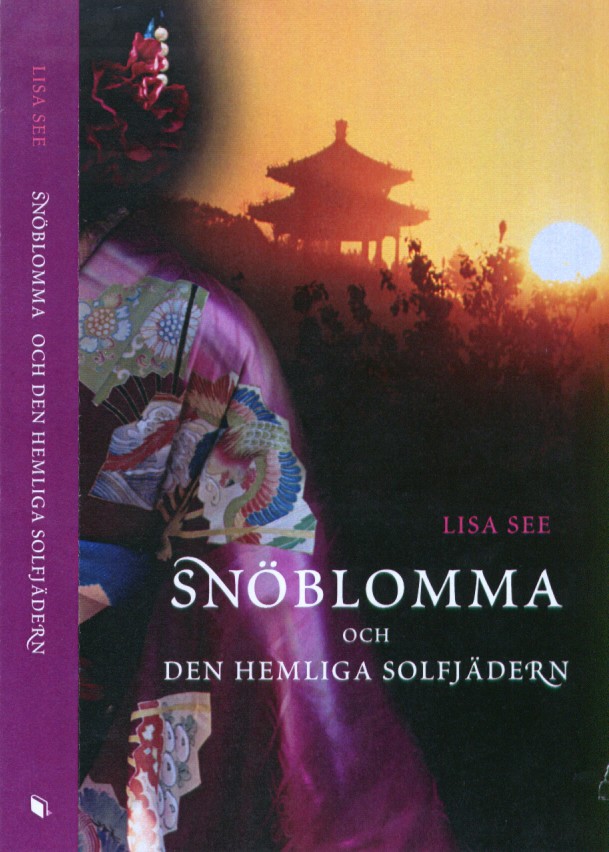This absorbing novel – with a storyline unlike anything Lisa See has written before – takes place in 19th century China when girls had their feet bound, then spent the rest of their lives in seclusion with only a single window from which to see. Illiterate and isolated, they were not expected to think, be creative, or have emotions. But in one remote county, women developed their own secret code, nu shu – “women’s writing” – the only gender-based written language to have been found in the world. Some girls were paired as “old-sames” in emotional matches that lasted throughout their lives. They painted letters on fans, embroidered messages on handkerchiefs, and composed stories, thereby reaching out of their windows to share their hopes, dreams, and accomplishments.
An old woman tells of her relationship with her “old-same,” their arranged marriages, and the joys and tragedies of motherhood—until a terrible misunderstanding written on their secret fan threatens to tear them apart. With the detail and emotional resonance of Memoirs of a Geisha, Snow Flower and the Secret Fan delves into one of the most mysterious and treasured relationships of all time—female friendship.
Buy the Book
paperback
EBOOK
AUDIOBOOK
Praise & Reviews
“A subtly stirring novel.”
―Vogue
“It’s hard to imagine that someone could write a better novel. The prose is elegant, the voice sure, the story unforgettable—at times punishing in its authenticity. With Snow Flower, See has written a novel that ranks with the best fiction of Amy Tan and Maxine Hong Kingston, the modern luminaries of Chinese storytelling.”
— Philadelphia Inquirer
“This is a fascinating portrait of a time and place alive with beauty and brutality.”
— USA Today
The wonder of this book is that it takes readers to a place at once foreign and familiar— foreign because of its time and setting, yet familiar because this landscape of love and sorrow is inhabited by us all. Snow Flower and the Secret Fan is a triumph on every level, a beautiful, heartbreaking story.”
—Washington Post
“A beautifully composed work.”
—Boston Globe
“See’s translucent prose style gleams with the beauty of 19th century Chinese culture but also makes us burn with indignation at its sexist ugliness and injustice. By bringing the secret world of these Chinese women into vivid relief, See has conjured up an alien world that is the better for being lost.”
—Los Angeles Times
“A stunning setup for describing a culture inside a story, and Lisa See takes full advantage of it. On every page, she provides fascinating details of the lives of women in China.”
—San Diego Union Tribune
“In her fourth book, See has triumphed, writing an achingly beautiful, understated and absorbing story of love…Snow Flower and the Secret Fan is so rich in psychology, feminine high stakes and marital intrigue that it evokes the work of Jane Austen. The warring matchmakers are marvelous characters, and the story made me recall the girl closest to my own laotong. See’s novel contains all the elements —joy, knowledge, betrayal, erotica — that give female friends a power over each other that husbands cannot match.”
—Cleveland Plain Dealer
“Exquisitely poetic and thought-provoking.”
—New Orleans Times-Picayune
“You can relish See’s extraordinary fourth novel as a meticulously researched account of women’s lives in 19th-century China, where it is ‘better to have a dog than a daughter.’ (And where the girls’ feet are bound in a stomach-turning ritual that See describes with admirable precision and coolness.) But you can also savor See’s marvelous narrative as a timeless portrait of a contentious full-blooded female friendship, one that includes, over several decades, envy, betrayal, erotic love, and deep-seated loyalty.”
—Entertainment Weekly
“Fascinating.”
—Detroit Free Press
“See uses a telephoto lens to give us an intimate view of festivals and famine, of customs and superstitions, all through the details of the ‘inner realm’ of women. The cultural insights are fascinating, but in the end this is a love story, with all the passion, betrayal, and regret that comes with the territory.”
—Body and Soul magazine
“See‘s fluid language, her re-creation of Lily and Snow Flower’s world, is engaging…See ably illuminates the roots of Lily and Snow Flower’s heartbreaking passivity, allowing us to identify with them enough to recognize the meaning of their lives despite the cultural restrictions of their time.”
―San Francisco Chronicle
“A provocative and affecting portrait of women in 19th Century China.”
—Chicago Tribune
“See’s writing is intricate and graceful, and her attention to detail never wavers, making for a lush, involving reading experience. This beautiful tale should have wide appeal.”
―Booklist
“Taut and vibrant, the story offers a delicately painted view of a sequestered world and provides a richly textured account of how women might understand their own lives.”
—Kirkus Reviews
“See’s engrossing novel set in remote 19th-century China details the deeply affecting story of lifelong, intimate friends (laotong, or “old sames”) Lily and Snow Flower, their imprisonment by rigid codes of conduct for women and their betrayal by pride and love….As both a suspenseful and poignant story and an absorbing historical chronicle, this novel has bestseller potential and should become a reading group favorite as well.“
—Publishers Weekly, starred review
“I was entranced by this wondrous book― the story of a secret civilization of women who actually lived in China not long ago. . . . Magical, haunting fiction. Beautiful.“
—Maxine Hong Kingston
“Achingly beautiful, a marvel of imagination of a real and secret world that has only recently disappeared. It is a story so mesmerizing that the pages float away and the story remains clearly before us from beginning to end.”
―Amy Tan
Excerpt
Sitting Quietly
I am what they call in our village “one who has not yet died”—a widow, eighty years old. Without my husband, the days are long. I no longer care for the special foods that Peony and the others prepare for me. I no longer look forward to the happy events that settle under our roof so easily. Only the past interests me now. After all this time, I can finally say the things I couldn’t when I had to depend on my natal family to raise me or rely on my husband’s family to feed me. I have a whole life to tell; I have nothing left to lose and few to offend.
I am old enough to know only too well my good and bad qualities, which were often one and the same. For my entire life I longed for love. I knew it was not right for me—as a girl and later as a woman—to want or expect it, but I did, and this unjustified desire has been at the root of every problem I have experienced in my life. I dreamed that my mother would notice me and that she and the rest of my family would grow to love me. To win their affection, I was obedient—the ideal characteristic for someone of my sex—but I was too willing to do what they told me to do. Hoping they would show me even the most simple kindness, I tried to fulfill their expectations for me— to attain the smallest bound feet in the county—so I let my bones be broken and molded into a better shape.
When I knew I couldn’t suffer another moment of pain and tears fell on my bloody bindings, my mother spoke softly into my ear, encouraging me to go one more hour, one more day, one more week, reminding me of the rewards I would have if I carried on a little longer. In this way, she taught me how to endure—not just the physical trials of footbinding or childbearing, but the more torturous pain of the heart, mind, and soul. She was also pointing out my defects and teaching me how to use them to my benefit. In our county, we call this type of mother love teng ai . My son has told me that in men’s writing it is composed of two characters. The first means pain ; the second means love . That is a mother’s love.
The binding altered not only my feet but my whole character, and in a strange way I feel as though that process continued throughout my life, changing me from a yielding child to a determined girl, then from a young woman who would follow without question whatever her in-laws demanded of her to the highest-ranked woman in the county who enforced strict village rules and customs. By the time I was forty, the rigidity of my footbinding had moved from my golden lilies to my heart, which held onto injustices and grievances so strongly that I could no longer forgive those I loved and who loved me.
My only rebellion came in the form of nu shu , our women’s secret writing. It appeared for the first time when Snow Flower—my laotong , my “old same,” my secret-writing partner—sent me the fan that sits here on my table, and then again after I met her. But apart from who I was with Snow Flower, I was resolved to be an honorable wife, a praiseworthy daughter-in-law, and a scrupulous mother. In bad times my heart was as strong as jade. I had the hidden might to withstand tragedies and sorrows. But here I am—a widow, sitting quietly as tradition dictates—and I understand that I was blind for too many years.
Except for three terrible months in the fifth year of Emperor Xianfeng’s reign, I have spent my life in upstairs women’s rooms. Yes, I have gone to the temple, traveled back to my natal home, even visited with Snow Flower, but I know little about the outer realm. I have heard men speak of taxes, drought, and uprisings, but these subjects are far removed from my life. What I know is embroidery, weaving, cooking, my husband’s family, my children, my grandchildren, my great-grandchildren, and nu shu . My life course has been a normal one—daughter days, hair-pinning days, rice-and-salt days, and now sitting quietly.
So here I am alone with my thoughts and this fan before me. When I pick it up, it’s strange how light it feels in my hands, for it records so much joy and so much grief. I open it quickly and the sound each fold makes as it spreads reminds me of a fluttering heart. Memories tear across my eyes. These last forty years, I have read it so many times that it is memorized like a childhood song.
I remember the day the intermediary handed it to me. My fingers trembled as I opened the folds. Back then a simple garland of leaves adorned the upper edge and only one message trickled down the first fold. At that time I didn’t know many characters in nu shu , so my aunt read the words. “I understand there is a girl of good character and women’s learning in your home. You and I are of the same year and the same day. Could we not be sames together?” I look now at the gentle wisps that compose those lines and see not only the girl that Snow Flower was but the woman she would become—persevering, straightforward, outward looking.
My eyes graze along the other folds and I see our optimism, our joy, our mutual admiration, our promises to one another. I see how that simple garland grew to be an elaborate design of interwoven snow blossoms and lilies to symbolize our two lives together as a pair of laotong , old sames. I see the moon in the upper right hand corner shining down on us. We were to be like long vines with entwined roots, like trees that stand a thousand years, like a pair of mandarin ducks mated for life. On one fold, Snow Flower wrote, “We of good affection shall never sever our bond.” But on another fold I see the misunderstandings, the broken trust, and the final shutting of the door. For me, love was such a precious possession that I couldn’t share it with anyone else and it eventually cut me away from the one person who was my same.
I am still learning about love. I thought I understood it—not just mother love, but the love for one’s parents, for one’s husband, and for one’s laotong . I’ve experienced the other types of love—pity love, respectful love, and gratitude love. But looking at our secret fan with its messages written between Snow Flower and me over many years, I see that I didn’t value the most important love—deep-heart love.
These last years I have copied down many autobiographies for women who never learned nu shu . I have listened to every sadness and complaint, every injustice and tragedy. I have chronicled the miserable lives of the poorly fated. I have heard it all and written it all down. But if I know much about women’s stories, then I know almost nothing about men’s, except that they usually involve a farmer fighting against nature, a soldier in battle, or a lone man on an interior quest. Looking at my own life, I see it draws elements from the stories of women and men. I am a lowly woman with the usual complaints, but inside I also waged something like a man’s battle between my true nature and the person I should have been.
I am writing these pages for those who reside in the afterworld. Peony, my grandson’s wife, has promised to make sure that they are burned at my death so that my story will reach them before my spirit does. Let my words explain my actions to my ancestors, to my husband, but most of all to Snow Flower, before I greet them again.
Chapter One
Milk Years
My name is Lily. I came into this world on the fifth day of the six month of the third year of Emperor Daoguang’s reign. Puwei, my home village, is in Yongming County , the county of Everlasting Brightness . Most people who live here are descended from the Yao ethnic tribe. From the storytellers who visited Puwei when I was a girl, I learned that the Yao first arrived in this area twelve hundred years ago during the Tang dynasty, but most families came a century later, when they fled the Mongol armies who invaded the north. Although the people of our region have never been rich, we have rarely been so poor that women had to work in the fields.
We were members of the Yi family line, one of the original Yao clans and the most common in the district. My father and uncle leased seven mou of land from a rich landowner who lived in the far west of the province. They cultivated that land with rice, cotton, taro, and kitchen crops. My family home was typical in the sense that it had two stories and faced south. A room upstairs was designated for women’s gathering and for unmarried girls to sleep. Rooms for each family unit and a special room for our animals flanked the downstairs main room, where baskets filled with eggs or oranges and strings of drying chilies hung from the central beam to keep them safe from mice, chickens, or a roaming pig. We had a table and stools against one wall. A hearth where Mama and Aunt did the cooking occupied a corner on the opposite wall. We did not have windows in our main room, so we kept open the door to the alley outside our house for light and air in the warm months. The rest of our rooms were small, our floor was hard-packed earth, and, as I said, our animals lived with us.
I’ve never thought much about whether I was happy or if I had fun as a child. I was a so-so girl who lived with a so-so family in a so-so village. I didn’t know that there might be another way to live and I didn’t worry about it either. But I remember the day I began to notice and think about what was around me. I had just turned five and felt as though I had crossed a big threshold. I woke up just before dawn with something like a tickle in my brain. That bit of irritation made me alert to everything I saw and experienced that day.
I lay between Elder Sister and Third Sister. I glanced across the room to my cousin’s bed. Beautiful Moon, who was my age, hadn’t woken up yet, so I stayed still, waiting for my sisters to stir. I faced Elder Sister, who was four years older than I. Although we slept in the same bed, I didn’t get to know her well until I had my feet bound and joined the women’s chamber myself. I was glad I wasn’t looking in Third Sister’s direction. I always told myself that since she was a year younger than me she was too insignificant to think about. I don’t think my sisters adored me either, but the indifference we showed each other was just a face we put on to mask our true desires. We each wanted Mama to notice us. We each vied for Baba’s attention. We each hoped that we would spend time each day with Elder Brother, since as the first son he was the most precious person in our family. I did not feel that kind of jealousy with Beautiful Moon. We were good friends and happy that our lives would be linked together until we both married out.
The four of us looked very similar to one another. We each had black hair that was cut short, we were very thin, and we were close in height. Otherwise, our distinguishing features were few. Elder Sister had a mole above her lip. Third Sister’s hair was always tied up in little tufts, because she did not like Mama to comb it. Beautiful Moon had a pretty moon face, while my legs were sturdy from running and my arms strong from carrying my baby brother.
“Girls!” Mama called up the stairs to us.
That was enough to wake up the others and get us all out of bed. Elder Sister hurriedly got dressed and went downstairs. Beautiful Moon and I were slower, because we not only had to dress ourselves but Third Sister as well. Then together we went downstairs, where Aunt swept the floor, Uncle sang a morning song, Mama—with Second Brother swaddled on her back—poured the last of the water into the teapot to heat, and Elder Sister chopped scallions for the rice porridge we call congee. My sister gave me a tranquil look that I took to mean that this morning she had already earned the approval of my family and was safe for the rest of the day. I tucked away my resentment, not understanding that what I was saw as her self-satisfaction was something closer to the cheerless resignation that would settle on my sister after she married out.
“Beautiful Moon! Lily! Come here! Come here!”
My aunt greeted us this way each and every morning. We ran to her. Aunt kissed Beautiful Moon and patted my bottom affectionately. Then Uncle swooped in, swept up Beautiful Moon in his arms, and kissed her. After he set her back down, he winked at me and pinched my cheek.
You know the old saying about beautiful people marrying beautiful people and talented people marrying talented people? That morning I concluded that Uncle and Aunt were two ugly people and therefore perfectly matched. Uncle, my father’s younger brother, had bowlegs, a bald head, and a round, shiny face. Aunt was plump, and her teeth were like jagged stones protruding from a karst cave. Her bound feet were not so small, maybe fourteen centimeters long, twice the size of what mine eventually became. I’d heard wicked tongues in our village say that this was the reason Aunt—who was of healthy stock, with wide hips—could not carry a son to term. I’d never heard these kinds of reproaches in our home, not even from Uncle. To me, they had an ideal marriage: he was an affectionate rat and she was a dutiful ox. Every day they provided happiness around the hearth.
My mother had yet to acknowledge that I was in the room. This is how it had been for as long as I could remember, but on that day I perceived and felt her disregard. Melancholy sank into me, whisking away the joy I had just felt with Aunt and Uncle, stunning me with its power. Then, just as quickly, the feeling disappeared, because Elder Brother, who was six years older than I was, called me to help him with his morning chores. Having been born in the year of the horse, it is in my nature to love the outdoors, but even more important I got to have Elder Brother completely to myself. I knew I was lucky and that my sisters would hold this against me, but I didn’t care. When he talked to me or smiled at me I didn’t feel invisible.
We ran outside. Elder Bother hauled water up from the well and filled buckets for us to carry. We took them back to the house, then set out again to gather firewood. We made a pile, then Elder Brother loaded my arms with the smaller sticks. He scooped up the rest and we headed home. When we got there, I handed the sticks to Mama, hoping for her praise. It’s not so easy for a little girl to lug a bucket of water or carry firewood after all. But Mama didn’t say anything.
Even now, after all these years, it is difficult for me to think about Mama and what I realized on that day. So clearly I saw that I was inconsequential to her. I was a third child, a second worthless girl, too little to waste time on until it looked like I would survive my milk years. She looked at me the way all mothers look at her daughters—as a temporary visitor who was another mouth to feed and a body to dress until I went to my husband’s home. I was five, old enough to know I didn’t deserve her attention, but suddenly I craved it. I longed for her to look at me and talk to me the way she did with Elder Brother. But even in that moment of my first truly deep desire, I was smart enough to know that Mama wouldn’t want me to interrupt her during this busy time when so often she had scolded me for talking too loudly or had swatted at the air around me because I got in her way. Instead, I vowed to be like Elder Sister and help as quietly and carefully as I could.
Grandmother tottered into the room. Her face looked like a dried plum, and her back bent so far forward that she and I saw eye to eye.
“Help your grandmother,” Mama ordered. “See if she needs anything.”
Even though I had just made a promise to myself, I hesitated. Grandmother’s gums were sour and sticky in the mornings, and no one wanted to get near her. I sidled up to her, holding my breath, but she waved me away impatiently. I moved so quickly that I bumped into my father—the eleventh and most important person in our household.
He didn’t reprimand me or say anything to anyone else. As far as I knew, he wouldn’t speak until this day was behind him. He sat down and waited to be served. I watched Mama closely as she wordlessly poured his tea. I may have been afraid that she would notice me during her morning routine, but she was even more mindful in her dealings with my father. He rarely hit my mother and he never took a concubine, but her caution with him made us all heedful.
Aunt put bowls on the table and spooned out the congee , while Mama nursed the baby. After we ate, my father and uncle set out for the fields, and my mother, aunt, grandmother, and older sister went upstairs to the women’s chamber. I wanted to go with Mama and the other women in our family, but I wasn’t old enough. To make matters worse, I now had to share Elder Brother with my baby brother and Third Sister when we went back outside.
I carried the baby on my back as we cut grass and foraged for roots for our pig. Third Sister followed us as best she could. She was a funny, ornery little thing. She acted spoiled, when the only ones who had a right to be spoiled were our brothers. She thought she was the most beloved in our family, although nothing showed her that this is true.
Once we were done with our chores, our little foursome explored the village, going up and down the alleys between the houses until we came across some other girls jumping rope. My brother stopped, took the baby, and let me jump too. Then we went home for lunch—something simple, rice and vegetable only. Afterwards, Elder Brother left with the men and the rest of us went upstairs. Mama nursed the baby again, then he and Third Sister took their afternoon naps. Even at that age I enjoyed being in the women’s chamber with my grandmother, aunt, sisters, cousin, and especially my mother. Mama and grandmother wove cloth, Beautiful Moon and I made balls of yarn, Aunt sat with brush and ink, carefully writing her secret characters, while Elder Sister waited for her four sworn sisters to arrive for an afternoon visit.
Soon enough we heard the sound of four pairs of lily feet come quietly up the stairs. Elder Sister greeted each girl with a hug, then the five of them clustered together in a corner. They didn’t like me intruding on their conversations, but I studied them nevertheless, knowing that I would be part of my own sworn sisterhood in another two years. The girls were all from Puwei, which meant that they could assemble often, and not just on special gathering days such as Catching Cool Breezes or the Birds Festival. The sisterhood had been formed when the girls turned seven. To cement the relationship, their fathers had each contributed twenty-five jin of rice, which was stored at our house. Later, when each girl married out, her portion of rice would be sold so that her sworn sisters could buy gifts for her. The last bit of rice would be sold on the occasion of the last sworn sister’s marriage. That would mark the end of the sisterhood, since the girls would have all married out to distant villages where they would be too busy with their children and obeying their mothers-in-law to have time for old friendships.
Even with her friends, Elder Sister did not attempt to grab attention. She placidly sat with the other girls as they embroidered and told funny stories. When their chatter and giggles grew loud, my mother sternly hushed them, and another new thought popped into my head: Mama never did that when my grandmother’s late-life sworn sisters come to visit. After her children were grown, my grandmother had been invited to join a new group of five sworn sisters in Puwei. Only two of them plus my grandmother, all widows, were still alive and they visited each other at least once a week. They made each other laugh and together they shared bawdy jokes that we girls didn’t understand. On those occasions, Mama was too afraid of her mother-in-law to dare to ask them to stop. Or maybe she was too busy…
Mama ran out of yarn and stood up to get more. For a moment she stayed very still, staring pensively at nothing. I had a nearly uncontrollable desire to run into her arms and scream, “See me. See me. See me.” But I didn’t. Mama’s feet had been badly bound by her mother. Instead of golden lilies, Mama had ugly stumps. Instead of swaying when she walked, she balanced herself on a cane. If she put the cane aside, her four limbs went akimbo as she tried to maintain her balance. Mama was too unsteady on her feet for anyone ever to hug or kiss her.
“Isn’t it time for Beautiful Moon and Lily to go outside?” Aunt asked, cutting into my mother’s daydream. “They could help Elder Brother with his chores.”
“He doesn’t need their help.”
“I know,” Aunt admitted, “but it’s a nice day—”
“No,” Mama said sternly. “I don’t like the girls wandering around the village when they should be working at their house learning.”
But about this one thing my aunt was stubborn. She wanted us to know our alleys, to see what lay down them, to walk to the edge of our village and look out, knowing that soon enough all we would see was what we could glimpse from the lattice window of the women’s chamber.
“They have only these few months,” she reasoned. She left unsaid that soon our feet would be bound, our bones broken, our skin rotting. “Let them run while they can.”
My mother was exhausted. She had five children, three of us five and under. She had the full responsibility of the household—doing all of the cleaning, washing, and repairing, cooking all of our meals, and keeping track of the household debts as best as she could. She had a higher status in the household than Aunt, but she could not fight every day for what she believed was proper behavior.
“All right,” Mama sighed in resignation. “They can go.”
I grasped Beautiful Moon’s hand and we jumped up and down. Aunt quickly shooed us to the door before my mother could change her mind, while Elder Sister and her sworn sisters stared after us wistfully. My cousin and I ran downstairs and outside. Late afternoon was my favorite part of the day, when the air was warm and fragrant, and the cicadas hummed. We scurried down the alley until we found my brother taking the family water buffalo down to the river. He rode on the beast’s broad shoulders, one leg tucked under him, the other bouncing on the animal’s flanks. Beautiful Moon and I walked single file behind them through the village’s maze of narrow alleys, the confusing tangle of which protected us from ghost spirits and bandits alike. We didn’t see any adults—the men worked in the fields and the women stayed in their upstairs chambers behind lattice windows—but the alleys were occupied by other children and the village’s animals—chickens, ducks, fat sows, and piglets squealing underfoot.
We left the village proper and rambled along a raised narrow path paved with small stones. It was wide enough for people and palanquins but too small for oxen- or pony-pulled carts. We followed the path down to the river and stopped just before the swaying bridge that crossed the Xiao River . Beyond the bridge, the world opened before us with vast stretches of cultivated land. The sky spread above us as blue as the color of kingfisher feathers. In the far distance, we saw other villages—places I never thought I would go in my lifetime. Then we climbed down to the riverbank where the wind rustled through the reeds. I sat on a rock, took off my shoes, then waded into the shallows. More than seventy years have gone by and I still remember the feel of the mud between my toes, the rush of water over my feet, the cold against my skin. Beautiful Moon and I were free in a way that we would never again be in our lives. But I remember something else very distinctly from that day. From the second I woke up, I had seen my family in new ways and they had filled me with strange emotions—melancholy, sadness, jealousy, and a sense of injustice about many things that suddenly seemed unfair. I let the water wash all that away.
That night after dinner, we sat outside, enjoying the cool evening air and watching Baba and Uncle smoke their long pipes. Everyone was tired. Mama nursed the baby a final time, trying to get him to fall asleep. She looked weary from the day’s chores, which were still not completely done for her. I looped my arm over her shoulder to give her comfort.
“Too hot for that,” she said, and gently pushed me away.
Baba must have seen my disappointment, because he took me onto his lap. In the quiet darkness, I was precious to him. For that moment, I was like pearl in his hand.
Discussion Guide
1. Lily endures excruciating pain in order to have her feet bound. What reasons are given for this dangerous practice?
2. Did See’s descriptions of footbinding remind you of any Western traditions?
3. If some men in 19th-century China knew about nu shu and “old same” friendships, why do you think they allowed these traditions to persist?
4. Reflecting on her first few decades, Lily seems to think her friendship with Snow Flower brought her more good than harm. Do you agree?
5. Lily’s adherence to social customs can seem controversial to us today. Pick a scene where you would have acted differently. Why?
6. Lily defies the wishes of her son in order to pair her grandson with Peony. Does she fully justify her behavior?
7. Lily sometimes pulls us out of the present moment to reflect–as an old woman–on her youthful decisions. What does this device add to the story?
8. How would you film these moments of reflection?
9. If Lily is writing her story to Snow Flower in the afterworld, what do you think Snow Flower’s response would or should be?
10. Did you recognize any aspects of your own friendships in the bond between Lily and Snow Flower?
Videos
Frequently Asked Questions
(FAQ)
I first heard about nu shu when I reviewed a book for the Los Angeles Times on the history of footbinding. It was just a short three or four page mention, but I thought, how could this exist and I didn’t know about it? Then I thought, how could this exist and we all didn’t know about it? Because so often we hear that in the past, there were no women writers, artists, historians, chefs, and the list goes on and on. Of course women did these things, but that work has been lost, forgotten, or deliberately covered up. Nu shu, on the other hand, was an example of something that women had invented, used, and kept a secret for a thousand years. That amazed me, and I have to say I became totally obsessed.
The first form of foot binding was said to have begun in China in the Tang Dynasty (618-907), when an emperor became entranced with a concubine who danced with silken ribbons on her feet. The other concubines, jealous of the attention she got from their august lord, started binding their feet with ribbons too.
During the Qing Dynasty (1636-1911), this practice was taken to the extreme. Feet wrapped in silk were no longer enough to draw attention or praise. To be marriageable, a girl was expected to have tiny feet. The ideal was the Golden Lotus, feet that are only 3-inches long.
This still doesn’t explain why it lasted so long—more than a thousand years! There are several reasons. First, it was a terrific economic status symbol for men. A man could say, “I’m so wealthy that, look, I have a wife with bound feet,” meaning she didn’t have to work. Or, “I’m so extraordinarily wealthy that even my servants have bound feet.” Now that was an extremely wealthy man. Second, men are men, so there was a whole sexual component to bound feet. Anything you could imagine they did with those bound feet, they did, and more. But that still doesn’t explain why it lasted so long. This was something that a mother did to her daughter. It was passed down generation to generation through the centuries. I think this is the hardest thing to understand—how a mother could inflict such terrible pain on her daughter. She did it because it was the one thing she could do to possibly give her daughter a better chance at life. If she could give her daughter a pair of perfectly bound feet, then maybe her daughter would marry into a better family and have a better life. If that was the only way you could help your daughter, wouldn’t you do it too?
To me, Lily and Snow Flower are very innocent. They’ve never been outside, so they haven’t even seen animals together. To me, the scene where they’re writing on their bodies is about becoming more intimate through writing, so I don’t see it as being homosexual at all. That said, I think Lily has an almost male possessiveness when it comes to Snow Flower.
Interestingly, at the exact same time in the U.S. and England, women—who also spent their lives pretty much confined by their corsets and in their marriages to men they barely knew or saw—also wrote letters to their women friends. Many scholars believe that the confinement and lack of any chance to actually be loved or give love resulted in a heightened emotional writing style that had nothing to do with sex and everything to do with the longing for love and emotion. But it’s also true that there’s small number of scholars who believe that these women writers—whether in China, the U.S., or England in the 1800s—did have homosexual relationships.
Step Inside:


